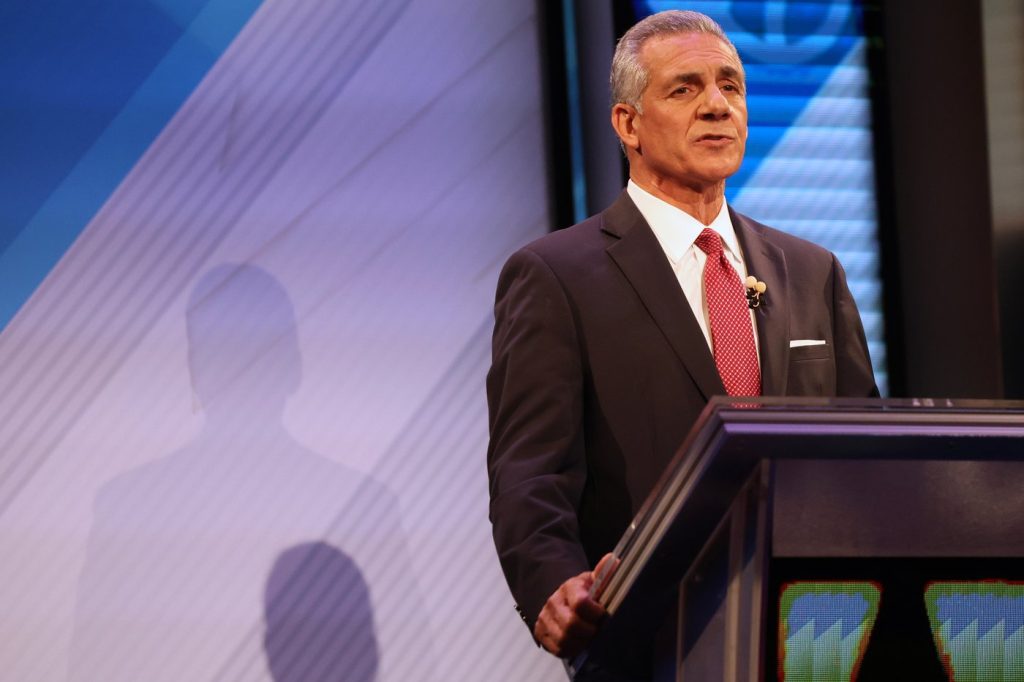TRENTON, N.J. (AP) — In the New Jersey gubernatorial race, Republican candidate Jack Ciattarelli has been attempting to balance his stance on immigration as he seeks to appeal to Latino voters while maintaining his alignment with former President Donald Trump. At a town hall aimed at Spanish-speaking constituents, Ciattarelli assured young Mexican immigrants brought to the U.S. as children that they would not face deportation if they have no criminal records. However, just a few days later, he participated in a rally where far-right commentator Jack Posobiec made light of building a detention center in New Jersey akin to Florida's “Alligator Alcatraz.”
Ciattarelli, who has openly supported Trump and awarded him an “A” grade for his presidency, is in a tight race against Democrat Mikie Sherrill. He has taken steps to distance himself from Trump’s stringent immigration policies, stating support for issuing driver’s licenses and Social Security numbers to undocumented individuals in the U.S. In recent forums and debates, Ciattarelli emphasized a “pathway to recognition” for immigrants, which he later indicated could serve as a preliminary step toward citizenship.
This nuanced approach is significant, particularly in light of Trump’s previous success in garnering votes from Latino communities, especially in New Jersey, where he managed to flip two Hispanic-majority towns in the 2020 election. Although New Jersey has historically leaned Democratic in presidential races, it has demonstrated a capacity to swing between parties in odd-year gubernatorial elections. Ciattarelli’s strategy seems aimed at attracting Latino voters who feel uncertain about the economy, particularly amid rising inflation, a primary concern for many constituents.
Despite his efforts to soften his stance on immigration, Ciattarelli remains aligned with Trump’s measures that advocate for increased deportations, even targeting individuals without criminal records beyond immigration violations. He has also stated that he would repeal New Jersey's Immigrant Trust Directive, which currently limits local law enforcement's cooperation with federal immigration agents and expressed a desire to eliminate birthright citizenship for children of undocumented immigrants.
During a recent debate, Ciattarelli reiterated his agreement with Trump on deporting individuals with “a history of criminality,” but branched out from Trump's hardline stance by proposing a path for other immigrants to gain recognition. He spoke candidly to Spanish-speaking audiences about his support for in-state tuition for undocumented students, a measure that contradicts the Trump administration’s policies.
As Ciattarelli navigates the politically sensitive landscape of immigration, Sherrill has responded critically to his proposed “pathway to recognition,” labeling it ineffectual and arguing that it fails to provide any real status for immigrants. Sherrill has distinguished herself as a defender against Trump’s policies, though she has not focused heavily on immigration in her campaign.
Despite potential backlash from more hardline Republicans, many party supporters, including former primary opponents, continue to back Ciattarelli's candidacy. They suggest that his stance appears more palatable compared to the immigration policies endorsed by Democratic rivals. As the campaign unfolds, Ciattarelli seeks to delineate his views on immigration, aiming to reassure voters that he can offer a compassionate approach to a demographic increasingly wary of the Trump administration.
In summary, the gubernatorial race in New Jersey is characterized by Ciattarelli’s complex positioning on immigration issues as he strives to win over Latino voters, all while attempting to harmonize his platform with Trump’s policies. The outcome in this pivotal election will likely hinge on both candidates' ability to address economic concerns that resonate with a significant portion of the electorate and their positions on immigration. As the campaign progresses, the political dynamics surrounding immigration will continue to play a vital role in shaping voter perceptions and influencing the election's direction.











